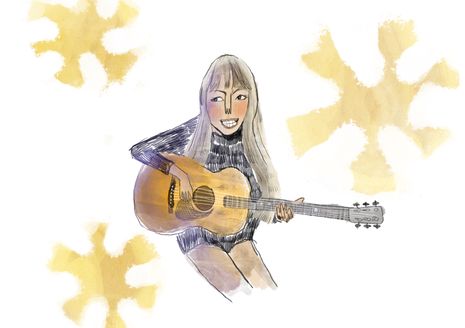Joni Mitchell’s manual for modern life
Rida Fatima explores Joni Mitchell’s renaissance and asks why her music still remains so relevant

The recent viral video of Amanda Seyfried has led to a resurgence of Joni Mitchell’s music back into mainstream media. The song ‘California,’ with its dream-like beginning lyrics, “Sitting in a park in Paris, France, Looking at the News, it sure looks bad” puts the listener in an instant trance. The feeling of spring in March is summoned by the soft undertones of her voice accompanying a guitar strummed by relaxed fingers. It lets you effortlessly imagine Joni holding a wine glass on a dimly lit French balcony, with her hair wild and her heart stuck in its twenties. Before I knew it, this song was being used over people’s Instagram stories back to back, which made me want to ask how it is that a woman born in the 50s had indirectly written songs for Gen Z women?
For me, the poignancy of Joni’s music lies in her youthful inquisitiveness and happy-go-lucky attitude to life which simultaneously pushes against the miserable background of the psychological and existential pain she expresses. Her earthy, sweet voice contrasts with the intensely bleak reality she is experiencing, escaping, and incapable of forgetting. Being a young, American artist in the 70s, you can feel the tension of the Vietnam war, the Watergate scandal’s staining of American politics, as well as the contingent state of women’s reproductive rights, distressing and empowering her lyrics.
“Joni’s lyrics perfectly capture the dichotomy of youthful optimism digging its way against societal decay and despair”
Perhaps chillingly, the issues of her time are indistinguishable to the political state of not only America, but the world as of now. We have a horrible war and humanitarian crisis in Gaza, Roe v Wade has been overturned, setting a horrible precedent for women’s autonomy and reproductive rights yet again, and Britain’s current economic decline has led to many young students feeling the encroaching job insecurity as they get pushed into the “real world.” Yet Joni’s lyrics perfectly capture the dichotomy of youthful optimism finding its way amidst societal decay and despair. It reminds me of a Gabriel Garcia quote that “Life is but a continual succession of opportunities for surviving,” and indeed the resilience of youth to stay free and creative in uncertain times shows a defiance in the face of external pessimism about the future of the world they will inherit.
While wider socioeconomic discourse is a motif in Joni’s music, the real core of her lyrics lies in emotional turbulence – growing pains. These are the emotions of lovesickness, loneliness, lack of belonging, and, the most vital one, of loss: meeting and losing people in the wilderness of youth. These are the same emotions that have become commonplace in my journaling and anxious discussion over coffee with friends. How can you love someone for longer than you’re allowed to? How can you fight against time and circumstance to hold onto friendships, places and memories when this pushes against the tide of reality? Her lyrics ruminate on how the intimacy of human connection we engage with is often intense but short lived, fundamentally unsustainable yet something we cannot live without. Emotional isolation is sacrificed for the hope of connection which leaves us with a gaping wound of invasive vulnerability, moulding the ever changing nature of our 20s.
“She embodies the current curiosity most young women my age should adopt with these long winding roads ahead of us”
Joni captures this complex feeling in ‘Carey’ when she says, “Oh, you know it sure is hard to leave here Carey, But it’s really not my home.” And in the same way, Cambridge will never be my final destination, it barely being the start and birth of my individualism, and yet I feel rudely awakened by it yanking its blanket of security off my bare bones. Her anxiety with herself expresses the frustration that comes with experiencing intimacy, at the cost of being given pain in return as well as love.
The beauty of Joni Mitchell lies in her impermanence and inability to stay still. Her lyrics draw on the “Winds of Africa,” the “Sun in Paris,” and the curiosity of “Amsterdam,” and with her we feel constantly on the move, searching for new experiences. There’s value in this for us as listeners, because she embodies the current curiosity most young women my age should adopt with these long winding roads ahead of us. Her music felt necessary to me because in the coming year, I’ll be working in the deep roots and ridges of South Asia, so far out of my comfort zone, and there will be nothing remotely familiarly English in the mountains and rivers of this hot, sweltering future. My vacation periods in the past year were also swarmed with legal internships in foreign European countries where I was left to uncover these cities on my own, unfamiliar with their people, streets, and way of life.
And yet, as Joni reminds us, this discomfort is the best thing to have happened to me for my self growth. I understand what it feels to have nothing but sometimes only my own confidence and desire for exploration to hold onto. How this loneliness can feel like Kryptonite and simultaneously crippling but manageable once you realise the magic of your life is in your own hands. This is echoed throughout her music: music marked with the pain and learning of someone who endlessly ambled and tried.
However, it would be tone deaf of me to not acknowledge that as liberating as her music is, there is, of course, a history of her as a performer using racially inappropriate behaviour and language — which is appalling. I wrote this article not to put the spotlight on her as a person, but more of what her lyrics can mean to young women — although whether these two concepts can be separated is part of a very intense, lengthy debate.
Want to share your thoughts on this article? Send us a letter to letters@varsity.co.uk or by using this form
 Features / Beyond the porters’ lodge: is life better outside college?24 February 2026
Features / Beyond the porters’ lodge: is life better outside college?24 February 2026 News / Cambridge academics sign open letter criticising research funding changes22 February 2026
News / Cambridge academics sign open letter criticising research funding changes22 February 2026 Theatre / Footlights Spring Revue? Don’t Mind if I Do!25 February 2026
Theatre / Footlights Spring Revue? Don’t Mind if I Do!25 February 2026 Fashion / The evolution of the academic gown24 February 2026
Fashion / The evolution of the academic gown24 February 2026 News / Student and union protesters hold ‘Trans Liberation Solidarity Rally’ 24 February 2026
News / Student and union protesters hold ‘Trans Liberation Solidarity Rally’ 24 February 2026









![How to Create an Attractive Freelancer Portfolio [5 Tips & Examples]](https://www.varsity.co.uk/images/dyn/ecms/320/180/2026/02/vitaly-gariev-ho2tNOWZYXM-unsplash-scaled.jpg)
